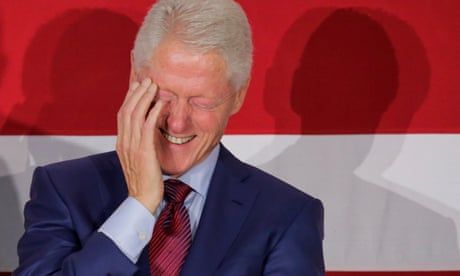
In this account of his years after leaving office, Clinton is a hyperactive and loquacious presence, helping out in disaster zones and pontificating about public service – but he reveals little about his private life
American presidents are supposed to renounce pomp and disappear into private life when their term ends. George Washington enjoyed sampling the whiskey produced by the distillery at his Virginia plantation, while George W Bush currently amuses himself by clearing underbrush on his Texas ranch. Bill Clinton, aged only 54 when he left office in 2001, spurned bucolic oblivion; as he says with scriptural solemnity: “I didn’t think my work here on Earth was finished just yet.” Although he calls his memoir Citizen to signal his reduced status, he admits to hankering after his years as a conqueror, with military bands that struck up Hail to the Chief as his personal anthem whenever he strode into a room.
Because the presidency has grown ever more undemocratically monarchical, Clinton toyed with a possible succession. His wife’s candidacy in 2016 offered him the prospect of returning to the White House as her First Gentleman, and his daughter, Chelsea, might have exotically extended the family line: in 2002 Muammar Gadaffi suggested marrying her to his son and thereby “launching a dynasty”. But Hillary lost to Trump, Chelsea nixed the proposal, and instead Clinton has incorporated himself. He set up the Clinton Foundation, kept it flush with his lecture fees and soon presided over an empire of eponymous acronyms - the CCI (Clinton Climate Initiative), the CDI (Clinton Development Initiative), the CGI (Clinton Global Initiative), the CHAI (Clinton Health Access Initiative), and so on to the end of the alphabet.
Continue reading...